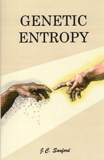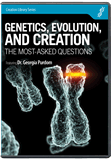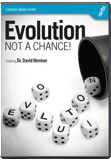
First Lizard Genome Sequenced
Lizard’s genomic agility unravels the mystery of modern life.
News Source
The green anole lizard has the honor of being the first real reptile1 to have its genome sequenced. Many evolutionists believe that reptiles and mammals diverged from a common ancestor 320 million years ago and that reptiles split into a bird-branch and a lizard-branch 280 million years ago. By comparing the lizard’s genome to chickens and humans, the team publishing in Nature believes it has discovered how far we’ve all flown from that original tree.
Any sort of similarity between the lizard and birds or mammals was interpreted as evidence of common ancestry. So was any difference. By assuming that evolution occurred, the researchers simply decorated the evolutionary tree with their data.
First, the team noted both reptiles and birds have small chromosomes and large chromosomes. Mammals do not. But birds have a lot more of the tiny chromosomes. Therefore, they conclude that the bird-lizard common ancestor had microchromosomes. As evolution progressed, either birds developed more or some lizard microchromosomes fused.
The researchers found that many paired genes showed up in the microchromosomes of both lizard and chicken. Again, evidence for common ancestry. But the banding pattern common to birds and humans did not appear in the lizard, so they said the chemical pattern that produces the banding must have “eroded”2 in the lizard lineage. And in examining the genes coding for egg-related genes, the team determined that placental mammals have lost some egg-related genes, of course assuming that the common ancestor had those genes.
The researchers found that many paired genes showed up in the microchromosomes of both lizard and chicken.
In comparing the 17,472 protein-coding genes of the green anole to the genes of eight other vertebrates (human, mouse, dog, opossum, platypus, chicken, zebra finch, and pufferfish), the team found 3,994 genes “that have not been duplicated or deleted in any of these vertebrates since their last common ancestor.” They then used the differences to construct a phylogenetic tree in order to “illuminate the history” of origins.
Delighted with a discovery related to human origins, researcher Jessica Alföldi noted that “Anoles have a living library of transposable elements,” bits of DNA that don’t code for anything and show up in lots of different locations. About a hundred of these were able to be matched up with counterparts on the human genome. Therefore, she concludes, “In anoles, these transposons are still hopping around, but evolution has used them for its own purposes, turning them into something functional in humans.” Pleased to have learned where humans got these non-coding genetic elements, she explains, “Sometimes you need to be at a certain distance in order to learn about how the human genome evolved.”
This comparative genetic study was certainly exhaustive, but the interpretation of the data in the shadow of the evolutionary tree of life is unjustified and unproven. Knowing that God designed all organisms to live in the same world, we should not be surprised to find that genes coding for the same proteins are needed in many, explaining the similarities across kinds. Each creature created in Creation week was fully equipped with the features it needed and the genes to code for many variations of those features. The fact that some things are similar and others are different does not show that reptiles, mammals, and birds share a common ancestor.
Further Reading
For More Information: Get Answers
Remember, if you see a news story that might merit some attention, let us know about it! (Note: if the story originates from the Associated Press, FOX News, MSNBC, the New York Times, or another major national media outlet, we will most likely have already heard about it.) And thanks to all of our readers who have submitted great news tips to us. If you didn’t catch all the latest News to Know, why not take a look to see what you’ve missed?
(Please note that links will take you directly to the source. Answers in Genesis is not responsible for content on the websites to which we refer. For more information, please see our Privacy Policy.)
Footnotes
- Of course, mammals and “avian reptiles” have had their DNA sequenced, but no real reptiles. Not even all evolutionists agree that birds are reptiles, just most who make it into the media spotlight lately.
- J. Alföldi et al., “The Genome of the Green Anole Lizard and a Comparative Analysis with Birds and Mammals,” Nature (2011), advance online publication doi:10.1038/nature10390.
Recommended Resources

Answers in Genesis is an apologetics ministry, dedicated to helping Christians defend their faith and proclaim the good news of Jesus Christ.
- Customer Service 800.778.3390
- © 2024 Answers in Genesis






